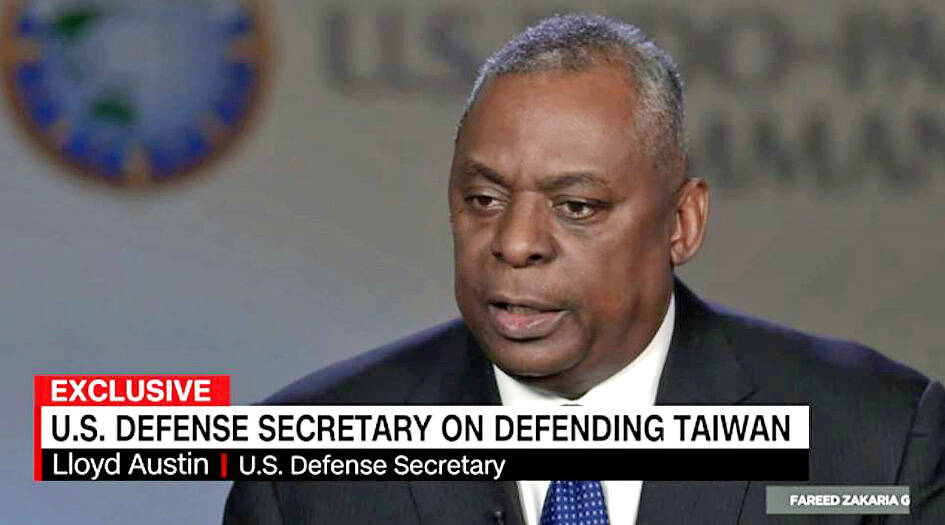US Secretary of Defense Lloyd Austin on Sunday said that he sees no imminent invasion of Taiwan by China, but said Beijing was trying to establish a “new normal” with its military activities around the nation.
A visit to Taiwan in early August by US House of Representatives Speaker Nancy Pelosi enraged China, which subsequently intensified military drills around the nation. Those have continued, although on a much reduced scale.
“I don’t see an imminent invasion,” Austin said in an interview on CNN’s Fareed Zakaria GPS that was recorded on Friday.

Photo: screen grab from CNN
“What we do see is China moving to establish what we would call a new normal. Increased activity — we saw a number of center-line crossings of the Taiwan Strait by their aircraft. That number has increased over time. We’ve seen more activity with their surface vessels and waters in and around Taiwan,” he said.
The US and its allies have responded to the drills by continuing to sail through the region. A US Navy warship and a Canadian frigate made a routine transit through the Taiwan Strait on Sept. 20.
The US would continue to work with its allies and partners “to ensure that we maintain a free and open Indo-Pacific,” Austin said in the interview.
The US would help Taiwan develop the capability to defend itself from a Chinese invasion, he added, stopping short of US President Joe Biden’s vow to send troops to the nation.
“We’re committed to helping Taiwan develop the capability to defend itself,” Austin said.
Washington has historically maintained a policy of “strategic ambiguity” on whether it would intervene militarily if Taiwan were attacked by China.
Asked in an interview with CBS last month whether US troops would defend Taiwan, Biden said “yes,” if it were “an unprecedented attack.”
Asked by CNN host Fareed Zakaria whether the US military was preparing to send troops to Taiwan in line with Biden’s comments, Austin declined to answer directly.
“The American military is always prepared to protect our interests and live up to our commitments. I think the president was clear in providing his answers as he responded to a hypothetical question,” Austin said.
“But, again, we continue to work to make sure that we have the right capabilities in the right places to ensure that we help our allies maintain a free and open Indo-Pacific,” he said.
Meanwhile, Austin said that the US is working to reopen channels of military communication with China.
Beijing in August halted cooperation with the US in a number of areas, including dialogue between senior-level military commanders, in retaliation for Pelosi’s visit to Taiwan.
Austin said he had spoken to Chinese Minister of National Defense General Wei Fenghe (魏鳳和) “on the phone and in person,” but the communication channel between them is “not open” right now.
“We’ll do everything we can to continue to signal that we want those channels open, and I would hope that China would begin to lean forward a bit more and work with us,” Austin said.

AGING: As of last month, people aged 65 or older accounted for 20.06 percent of the total population and the number of couples who got married fell by 18,685 from 2024 Taiwan has surpassed South Korea as the country least willing to have children, with an annual crude birthrate of 4.62 per 1,000 people, Ministry of the Interior data showed yesterday. The nation was previously ranked the second-lowest country in terms of total fertility rate, or the average number of children a woman has in her lifetime. However, South Korea’s fertility rate began to recover from 2023, with total fertility rate rising from 0.72 and estimated to reach 0.82 to 0.85 by last year, and the crude birthrate projected at 6.7 per 1,000 people. Japan’s crude birthrate was projected to fall below six,

US President Donald Trump in an interview with the New York Times published on Thursday said that “it’s up to” Chinese President Xi Jinping (習近平) what China does on Taiwan, but that he would be “very unhappy” with a change in the “status quo.” “He [Xi] considers it to be a part of China, and that’s up to him what he’s going to be doing, but I’ve expressed to him that I would be very unhappy if he did that, and I don’t think he’ll do that. I hope he doesn’t do that,” Trump said. Trump made the comments in the context

SELF-DEFENSE: Tokyo has accelerated its spending goal and its defense minister said the nation needs to discuss whether it should develop nuclear-powered submarines China is ramping up objections to what it sees as Japan’s desire to acquire nuclear weapons, despite Tokyo’s longstanding renunciation of such arms, deepening another fissure in the two neighbors’ increasingly tense ties. In what appears to be a concerted effort, China’s foreign and defense ministries issued statements on Thursday condemning alleged remilitarism efforts by Tokyo. The remarks came as two of the country’s top think tanks jointly issued a 29-page report framing actions by “right-wing forces” in Japan as posing a “serious threat” to world peace. While that report did not define “right-wing forces,” the Chinese Ministry of Foreign Affairs was

PREPAREDNESS: Given the difficulty of importing ammunition during wartime, the Ministry of National Defense said it would prioritize ‘coproduction’ partnerships A newly formed unit of the Marine Corps tasked with land-based security operations has recently replaced its aging, domestically produced rifles with more advanced, US-made M4A1 rifles, a source said yesterday. The unnamed source familiar with the matter said the First Security Battalion of the Marine Corps’ Air Defense and Base Guard Group has replaced its older T65K2 rifles, which have been in service since the late 1980s, with the newly received M4A1s. The source did not say exactly when the upgrade took place or how many M4A1s were issued to the battalion. The confirmation came after Chinese-language media reported